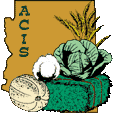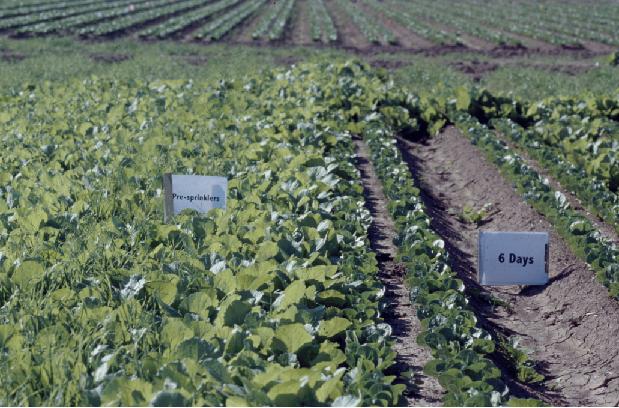 |
|
|
|

|
|||
| |
|||
Weed scientist and Area Agriculture Agent Barry Tickes from the University of Arizona Yuma Ag Center has conducted several trials to determine the best application method of Pronamide Herbicide (Kerb) in lettuce. His studies in 2000 (1 year before 9/11) demonstrated that in the low desert where the product had been applied after planting and before starting sprinkler irrigation it is often leached below weed seeds prior to germination and some efficacy is lost. This experiments in which he stopped the sprinklers and sprayed plots with a CO2 backpack in the mud showed that Kerb applications should be delayed from 1 to 6 days after starting sprinklers depending upon the time of the season. This delayed applications at the time required that aerial applications be made, but after the terrorists attacks 10 years ago all air traffic was suspended. Then PCAs asked if the product could be chemigated (applied by sprinkler irrigation) and Tickes conducted several trials in the Yuma area to answer this question. Surprisingly these trials revealed that the product performed better chemigated than applied by air. Today most of the Kerb in Arizona is chemigated and applied in delayed applications, also this method is extensively used in California. It all started with a little trial in Yuma AZ and then 9/11 creating circumstances that forced the industry to take that course. If you would like to review the data from this research please read: Timing Kerb Applications in Lettuce and Evaluation of Kerb Applied by Sprinkler Irrigation to Lettuce both by Barry Tickes. Timing Kerb Applications in Lettuce To contact Marco Peņa go to: marcop@ag.arizona.edu
|
|||
| Back | |||
For questions or comments on any of the topics please contact Marco Pena at the Yuma Agricultural Center. |
|||
| Home | Cotton
| Veggies | Forages
| Grains | Citrus
| Crop x Crop Insects | Diseases| Weeds | Pesticides | Economics | News | Weather | Research | Photos | Contacts | General Info. Copyright © 2001 University of Arizona, College of Agriculture and Life Sciences Webmaster: Al Fournier (acis@ag.arizona.edu) |
|||
